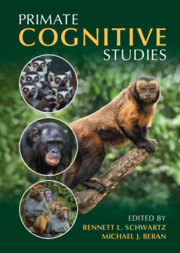Book contents
- Primate Cognitive Studies
- Primate Cognitive Studies
- Copyright page
- Contents
- Figures
- Tables
- Contributors
- Acknowledgments
- 1 The Purpose of Primate Cognitive Studies
- 2 A History of Primates Studying Primates
- 3 Genetic and Environmental Influences on Chimpanzee Brain and Cognition
- 4 The Evolution of Cognition in Primates, Including Humans
- 5 State of the Field
- 6 Current Perspectives on Primate Perception
- 7 The Comparative Study of Categorization
- 8 Numerical Cognition in Nonhuman Primates
- 9 The Natural History of Primate Spatial Cognition
- 10 Progress and Prospects in Primate Tool Use and Cognition
- 11 Sequencing, Artificial Grammar, and Recursion in Primates
- 12 The Evolution of Episodic Cognition
- 13 Metacognition
- 14 Bridging the Conceptual Gap between Inferential Reasoning and Problem Solving in Primates
- 15 The Eyes Have It
- 16 Social Cooperation in Primates
- 17 Primate Communication
- 18 Theory of Mind in Nonhuman Primates
- 19 A Requiem for Ape Language Research
- 20 Primate Empathy
- 21 Replication and Reproducibility in Primate Cognition Research
- 22 Ethical Considerations in Conducting Primate Cognition Research
- 23 Collaboration and Open Science Initiatives in Primate Research
- 24 Studying Primate Cognition
- 25 Do Monkeys Belong in the Ape House?
- Index
- References
13 - Metacognition
Published online by Cambridge University Press: 28 July 2022
- Primate Cognitive Studies
- Primate Cognitive Studies
- Copyright page
- Contents
- Figures
- Tables
- Contributors
- Acknowledgments
- 1 The Purpose of Primate Cognitive Studies
- 2 A History of Primates Studying Primates
- 3 Genetic and Environmental Influences on Chimpanzee Brain and Cognition
- 4 The Evolution of Cognition in Primates, Including Humans
- 5 State of the Field
- 6 Current Perspectives on Primate Perception
- 7 The Comparative Study of Categorization
- 8 Numerical Cognition in Nonhuman Primates
- 9 The Natural History of Primate Spatial Cognition
- 10 Progress and Prospects in Primate Tool Use and Cognition
- 11 Sequencing, Artificial Grammar, and Recursion in Primates
- 12 The Evolution of Episodic Cognition
- 13 Metacognition
- 14 Bridging the Conceptual Gap between Inferential Reasoning and Problem Solving in Primates
- 15 The Eyes Have It
- 16 Social Cooperation in Primates
- 17 Primate Communication
- 18 Theory of Mind in Nonhuman Primates
- 19 A Requiem for Ape Language Research
- 20 Primate Empathy
- 21 Replication and Reproducibility in Primate Cognition Research
- 22 Ethical Considerations in Conducting Primate Cognition Research
- 23 Collaboration and Open Science Initiatives in Primate Research
- 24 Studying Primate Cognition
- 25 Do Monkeys Belong in the Ape House?
- Index
- References
Summary
Metacognition, or awareness of one’s cognition, involves several different but overlapping cognitive abilities, such as working memory, explicit memory, monitoring, and control. These processes are guided by multiple internal or external signals, including memory signals in the case of metamemory. Primate species including apes and rhesus monkeys have demonstrated that they can respond to both internal and external signals, and like humans, these signals can be additive and fallible. In the past few decades, there have been about five dozen studies published on nonhuman animal metacognition and while robust results have been obtained, rigorous experimental paradigms have been employed, and general progress has been made, there is a still a lot we do not know. For example, there are only a few species whose metacognitive abilities have been relatively well characterized, and even in those species significant open questions remain. After an introduction, what is known and what is not known will be explored. Similarities and differences among different primate species will be highlighted. As the chapter is comparative in nature, disparities in behavioral findings across apes and monkeys, New World and Old World monkeys, as well as primates and non-primate species will be explored. The extent to which methods can or cannot be standardized across species will be discussed, with special consideration of species’ ecological niches and experimental methods typically employed. Limitations in nonhuman metacognition research will also be considered, including the fact that most metacognition studies focus on just one species. Finally, possibilities for promising future directions in research will be offered.
Keywords
- Type
- Chapter
- Information
- Primate Cognitive Studies , pp. 314 - 340Publisher: Cambridge University PressPrint publication year: 2022
References
- 5
- Cited by

